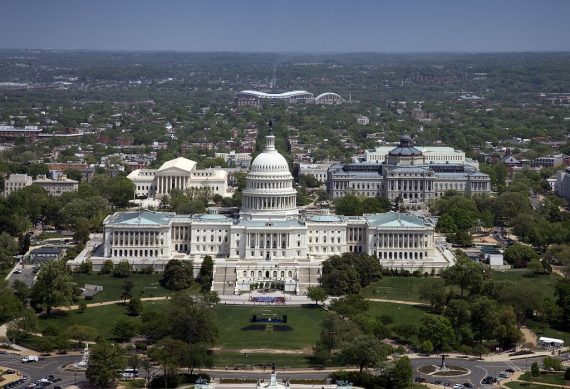Retiring Congressman: Members Of Congress Are Underpaid
Time to have some sympathy for those poor penny-pinching Congressmen and Senators? Hardly.

Jim Moran, who has represented Virginia’s 8th Congressional District (mostly consisting of the City of Alexandria and Arlington County) since winning election in 1990, argues that Members of Congress aren’t paid enough:
Rep. Jim Moran (D-Va.) said in an interview with Roll Call on Thursday that members of Congress are underpaid and can’t afford to live “decently” in Washington.
“I think the American people should know that the members of Congress are underpaid,” Moran said. “I understand that it’s widely felt that they underperform, but the fact is that this is the board of directors for the largest economic entity in the world.”
Members of Congress make $174,000 per year currently.
Moran added: ”Our pay has been frozen for three years and we’re planning on freezing it a fourth year. … A lot of members can’t even afford to live decently in Washington.”
Moran said he will introduce an amendment to fix the problem during debate over the Legislative Branch bill.
Given Congress’s near-record-low approval ratings, of course, it’s unlikely many Americans will sympathize with members’ financial plights.
That last part, of course, is an understatement. For the last several years at least, overall Congressional Job Approval has been below 15% on a fairly consistent basis, and in the single digits on more than one occasion. We’ve recounted the reasons for this drop in public opinion repeatedly so there’s really no need to go over them again. At the very least, though, it’s fairly apparent that the public wouldn’t react very positively to a an effort to increase Congressional pay, although given the rate at which incumbents are re-elected even in tough election years it seems unlikely that most Members of Congress would be hurt at the ballot box if they voted in favor of a pay raise for themselves.
As to Moran’s claims themselves, it’s certainly true that living in the D.C. area can be expensive especially when one factors into the equation the need to maintain a residence back home. Over the years, though, many Members of Congress have found ways to deal with this issue. Some have gone so far as to sleep in their offices, others end up sharing space with other Members of Congress. Given the fact that most members end up leaving town on weekends or when Congress isn’t in session, there’s not much of a need for palatial surroundings. Another option that has been utilized in the past is dormitory style housing for Members of Congress, something which largely disappeared around the middle of the 20th Century but which may well be a cost effective option to address the alleged problem that Moran cites here.
More broadly, though, it seems pretty apparent that Moran’s complaints are just specious. A member of the House of Representatives or Senate receives a base salary of $174,000 excluding the annual cost of living adjustment permitted by law and members of the leadership of each body receive higher salaries than that. This is far higher than the median income nationally as well as in the D.C. area as a whole. Cries of poverty tend to fall on deaf ears when you look at it that way, and that even becomes more apparent when you realize how many members of the House and Senate have become independently wealthy thanks to their time in Washington (such as Mr. Moran) or became wealthy before then (such as Darrell Issa). Moreover, as Ed Morrissey notes, if being a Member of Congress was such a financial hardship you’d expect to see people responding to it the way they respond to any low-paying job:
One measure of whether compensation meets the needs of an organization is to take a look at turnover. How many of the incumbents seek re-election in any given cycle? There have been roughly 30 retirement announcements for this term, a few of which may involve seeking a Senate office. Thirty out of 435 equals a turnover rate of less than 7% — which would not sound like a compensation crisis to anyone in the business world.
Obviously if Congressmen and Senators really thought they were unpaid they’d seek employment in a more lucrative, and more honorable, profession.






I’ll risk the inevitable scorn by saying that I think he’s right. Congressmen make less than a high school principal in some districts. This means their incentive cannot be money, but must either be power or idealism, either of which is dangerous. Too many rational, capable, experienced people would look at that number and just laugh. You’re excluding almost everyone who is capable of making substantially more – and those are the people we need to be hiring.
I think we need reform in how “residence” is defined. This
doesn’t mean that Congressmen are underpaid. It means that DC and adjacent areas of Virginia and Maryland are enormously over-represented.
I see very little reason that more than 300 years later we’re still working under an 18th century operational model. It’s as though telephones, the Internet, and videoconferencing had never been invented.
For him to say that one “can’t even afford to live decently in Washington” on $174,000 is a ridiculous thing to say. You can live more than decently on that salary in Manhattan, which has a hell of a lot higher cost of living than DC. I had a few friends that worked as associates at law firms in Manhattan and they lived just fine on salaries lower than that.
What he really means is: members of congress can’t afford to live in mansions like any good plutocrat expects to on $174,000 in DC.
There’s a big difference there.
(uncontrollable laughter)
@michael reynolds:
This is a serious question rather than a rhetorical one What makes you think that paying Congressmen more will result in Congressmen no longer being motivated by power? Also, how much is enough?
Avarice is not self-limiting and that’s as true for Congressmen as it is for corporate CEOs.
Moran mentions the idea of a per diem. Not bad.
I don’t think Congresspeople should make more than the minimum wage. Maybe they won’t be so quick to cut food stamp subsidies when it affects them directly.
edmondo is right…pay them minimum wage…they do minimum work.
and drug test ’em!!!
Sociologists identify three ways in which a person has influence on society: power, prestige, and property. Congressmen get plenty of all three by any reasonable metric, and regularly trade one for the other when needed.
Yeah, that doesn’t help your case. Not only do they underperform, but they underperform in one of the
biggest companieswealthiest nations in the world?!Show me some multiple term-serving Congressmen who later fell beneath the poverty line (or, hell, beneath the median wage (~$50,000) in yearly earnings) and I’ll believe they’re hideously underpaid.
I do have sympathy for the Congressmen. Being a representative shouldn’t be a loss leader for future earnings based on networking.
I like Shuler’s idea. Let’s decentralize Congress. They can live and work out of their districts. Has the added value of breaking up the lobbyists.
http://www.nytimes.com/2014/01/10/us/politics/more-than-half-the-members-of-congress-are-millionaires-analysis-finds.html?_r=0
@C. Clavin:
And while I’m at it…stop sleeping in my building!!!
http://www.nytimes.com/2011/01/07/us/politics/07sleep.html?pagewanted=all
I really think the solution is re institute the draft and draft our Congress critters. I used to think that would lower the IQ of congress but I can’t really say that anymore thanks to the Tea Party.
@Dave Schuler:
I agree, enough is never enough. (If you’d been privy to my possibly self-destructive day you’d realize how deeply I do get that.) But excluding everyone who wants to make a good living means shrinking the labor pool down to those who focus more exclusively on power and ideology. Most sensible people want to make a good living. The kinds of people who are 1) Capable of making a good living but choose instead to 2) Take a job despite the weak pay, worry me.
Picking a number out of the air, I’d think 250k to start with raises to 500k, but with a rider that requires them to pay 10k back into the treasury for every appearance on Meet the Press.
The good news is that the Supreme Court has just ruled that congresspeople no longer have to live on that puny salary. They can take sacks full of cash from billionaires, and unless they specifically promise a certain action in return, it’s not corruption.
@michael reynolds:
There is no fixed definition for “a good living”. It starts out with having a roof over your head, some underwear, jeans, and a sweatshirt, and three squares. Then it’s a house in a suburb with good schools, a decent suit every couple of years, and eating out at a nice restaurant every once in a while.
Eventually “a good living” is enough for a 10,000 square foot mansion in the Hamptons, bespoke suits from Savile Row, sending your kids to Fessenden School, and flying off in your private jet for weekends in Bermuda.
Can’t say I blame them. They work so hard to get these folks more and more,
Of course they want their cut, and don’t want to wait until they Jump on the lobbyist gravy train.
Here’s my proposal: pay Congressmen median income. If the median rises, so does their income. If it falls, likewise. It will be an incentive.
@Dave Schuler:
That’s a great idea…or peg it to the median like an adjustable mortgage…Median +20%, or whatever.
@Dave Schuler:
Nonsense. Not the Hamptons, Malibu. Then you don’t need the bespoke suits, but you may need the Lamborghini.
@michael reynolds:
Okay, Robin.
I think they could stand to be paid more if only to incentivize more people to seek Congress, as Michael says, but not during such inactivity as we’re seeing, not during what looks like a depression, and not while the tax code remains the mess it is.
How about a compromise? Double the salaries in congress, but limit the election campaign spending to the same amount?
It isn’t the pay but the system that is a problem. To me $174,000 sounds like a great living, especially since if I were in their shoes I would see if I could find some gov subsidized housing. I think the real problem is that these people sink millions into their own elections which means you need to be connected or independently rich to get there in the first place. Follow that up with lobbyists, rich campaign donors and others throwing money around in ways you never will. It is no wonder the anti-insider trading rule for congress only lasted a couple months, these people look at elections as an investment. Which is why so many become so wealthy either while serving or riding the gravy train of lobbying when they leave. I would be all for paying congress more if they capped campaign spending and offered competitive public campaign financing. This would see that not only the rich can run and with higher pay at least quid pro quo from donors will cost them a lot more. It would give the members of congress time to actually read bills again, instead of spending 90% of their time fund raising. And again maybe our government could be represented by citizen stakeholders and not just the plutocrats. In short public financing of elections then higher pay.
@edmondo: thumbs up 1000 times
” A lot of members can’t even afford to live decently in Washington.””
The median income in the DC Metro area is $88K. The good Congressman would do well to remember it.
So how did Harry Reid accumulate so much wealth?
As a public servant his entire adult life, I mean.
@michael reynolds:
Agree with your first statement, Mr Reynolds, I do think they are underpaid. They do, after all, make policy far beyond what a CEO does for a single corporate entity (often).
Although I find Congresspeople to be maddening on many levels, they do have families, and many have families in their home districts. DC isn’t cheap, and I think they should have decent places to live whilst legislating.
Keeping Congressional pay low leaves the position wholly in the hands of those who have money prior to election. Make all contributions completely transparent, give them a realistic wage.
I think that it’s probably irrelevant if they are underpaid because public perception of the issue is overwhelmed by crude moralistic judgements and onanistic cynicism toward Congress with no genuine regard for outcomes. There are probably some for whom there are no greater cost-saving imperatives than to vindictively slash congressional pay, except perhaps for foreign aid. People hate Congress, but I think that they also love hating it, so the great worm of the public can have a grand time eating its own tail.
@Ben:
Remember that the Congressman all have children who attend expensive private schools (more than $20k per year or attend expensive private universities (more than $50k per year).
It is hard to afford Vanderbilt or Boston University on $175K a year in addition to paying for two residences. I doubt if those Big Law Associates have children at the Dalton School.
The problem is not the pay per se. But that the relative small pay creates incentives for corruption and conflict of interest. There is also the issue of revolving door: these people REALLY make money when they go to the private sector.
@charles austin: Ask Paul Ryan.
@Pinky:
We can do better, though. The millionaire Congressbeings don’t need a per diem any more than they need extra salary.
I like my wife’s idea: Congressbeings are always hyper about means-testing government handouts, to make sure only the deserving and needy get anything. Why should the rules be any different for them? Any Congressbeings who can document that they are sufficiently impoverished that the cost of DC room and board is a hardship on their families (despite their far-above-median salaries) can qualify for a Housing Subsidy (to be administered by HUD) and/or food stamps (through SNAP).
On the other end of the scale, I simply don’t think there are many people out there for whom all of the following are true:
1) They would be better Congressbeings that the one’s we’ve been getting
2) They would like to be Congressbeings
3) They could get themselves elected to Congress, should they choose to run
4) They aren’t running because the pay isn’t good enough
Until there are people like that, better pay for Congressbeings isn’t an issue.
@Andre Kenji:
It seems to me that you just contradicted yourself. Given how much it pays to be a former Congressperson and/or how lucrative it is to be a corrupt Congressperson, the salary is irrelevant — there’s no honest salary we could pay them that would compete.
Or, to put it another way: you can’t entice someone who would otherwise become a drug lord to go straight instead by paying a competitive salary.
I just want to point out the hypocrisy of complaining about Congressmen. 100% of them are elected by voters. The problem is the voters, the very people complaining about Congress. We have met the enemy and he is us.
@michael reynolds:
Non-sequitur, Michael. It’s only hypocrisy if you also claim not to be an elitist.
Personally, I think most voters (and most people in general) are ignorant sheep. Democracy is my preferred form of government for reasons that have nothing to do with any belief that the majority opinion is informed, defensible, or even sane. It’s all about damage control and stability; the famous Churchill quotation is apt.
@DrDaveT:
The point is not about being a corrupt Congressperson: the problem is that being a former Congressperson working in K Street is FAIR more lucrative than being a current Congressperson.